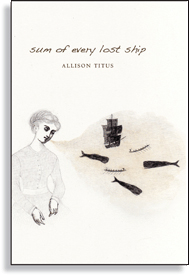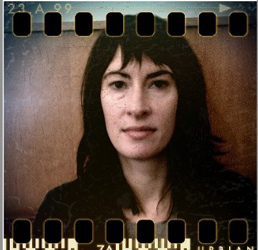
First Book Questionnaire: Allison Titus | September 14, 2012.
1. Does your manuscript bear any relation to a graduate thesis project?
No not really, although a few poems from my thesis ended up in the final book.
2. How do you feel about these poems now that they’ve materialized in book format?
They feel removed from me, a little like ghosts and a little bit ancient, because I work so slowly that by the time the book came into being, I’d lived with some of the poems for years. Mostly I feel they were the poems I had to write in order to get over some preoccupations and in order to ever write different poems.
3. What was your experience when you began publishing? What challenges did you encounter?
I remember there was a long long stretch where I couldn’t get any single thing accepted, anywhere, and that made me feel like I had no idea what I was doing, which I didn’t, but then something shifted and I started to have better luck. I do wish I had waited a lot longer before I tried to publish things, that I hadn’t felt compelled to chalk things up.
4. How, if at all, did chapbooks prepare you for the making of a full-length collection?
I have one chapbook from the gorgeous Bateau Press, and it contains what I think of as the core poems of my full-length book, so I guess it’s definitely a smaller rendition of the finished thing. I think what it did was give those poems some momentum for me.
5. How did you shape and order your manuscript?
I wanted sections that linked, but were also discrete, like rooms, connected but solitary. I wanted the book’s progression to feel like a long, poorly lit hallway, if the rooms were sanctuary from that ramble and claustrophobia.
6. Was anyone or anything indispensable in the process of making your debut collection?
Yes, Michael Dumanis at Cleveland State Poetry Center, definitely, and also—maybe not so much mechanically as in the way of having steadfast and important support from—several of my favorite poet friends and my husband, who’s also a poet, and a teacher I studied with at Vermont College. In terms of the idea of the thing, I felt bolstered by a group of generous people for sure.
7. What is your impression of book contests?
That they are one way to get your book of poems published.
8. How did you learn to navigate the press world?
N/A?
9. What aspirations did you have for this book?
I hoped that it would find readers who responded to something in it, even in a tiny way, which would justify its existence as a book, that it would resonate with someone somewhere who’d take it home and let it live in their house.
10. How would you describe this work?
I think of it as an epistolary.
11. Do you work primarily on discrete poems, serially, toward a project, with a set of concerns, or otherwise?
I think I work in all of those ways, depending on what the impetus of the poem/project is, although lately I have been working more in series, establishing one primary concern and then approaching it over and over, from different angles. I am obsessive, too, so this actually makes a fundamental sense to my brain.
12. Whose poems affect you or your work?
Most recently: Kerri Webster, AM Marshall, Cori A. Winrock, Frank Stanford, Shelly Taylor.
13. What are you working on now?
I’m working on a series of office poems that overlaps with a series of animal poems, and a novel.
